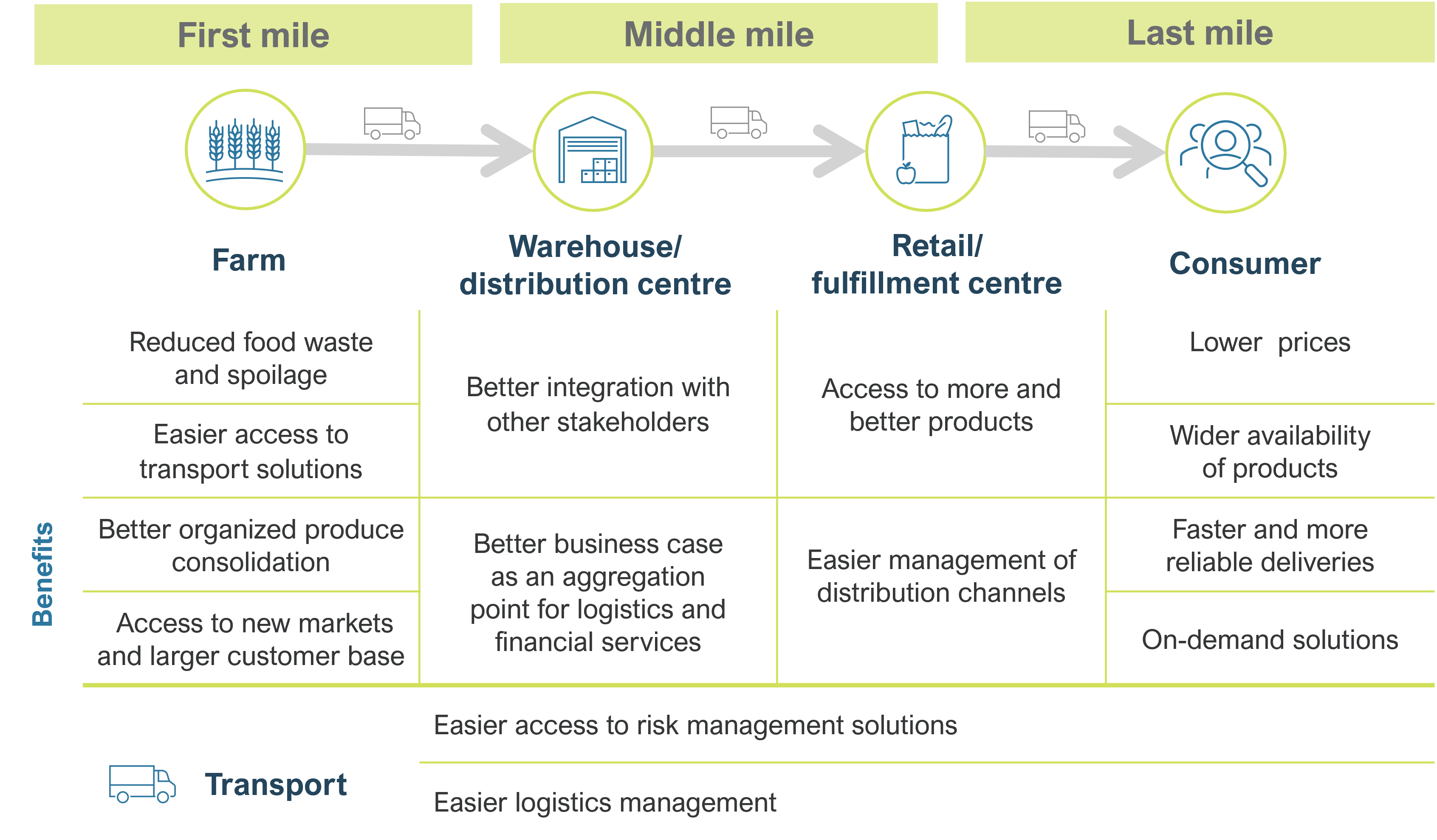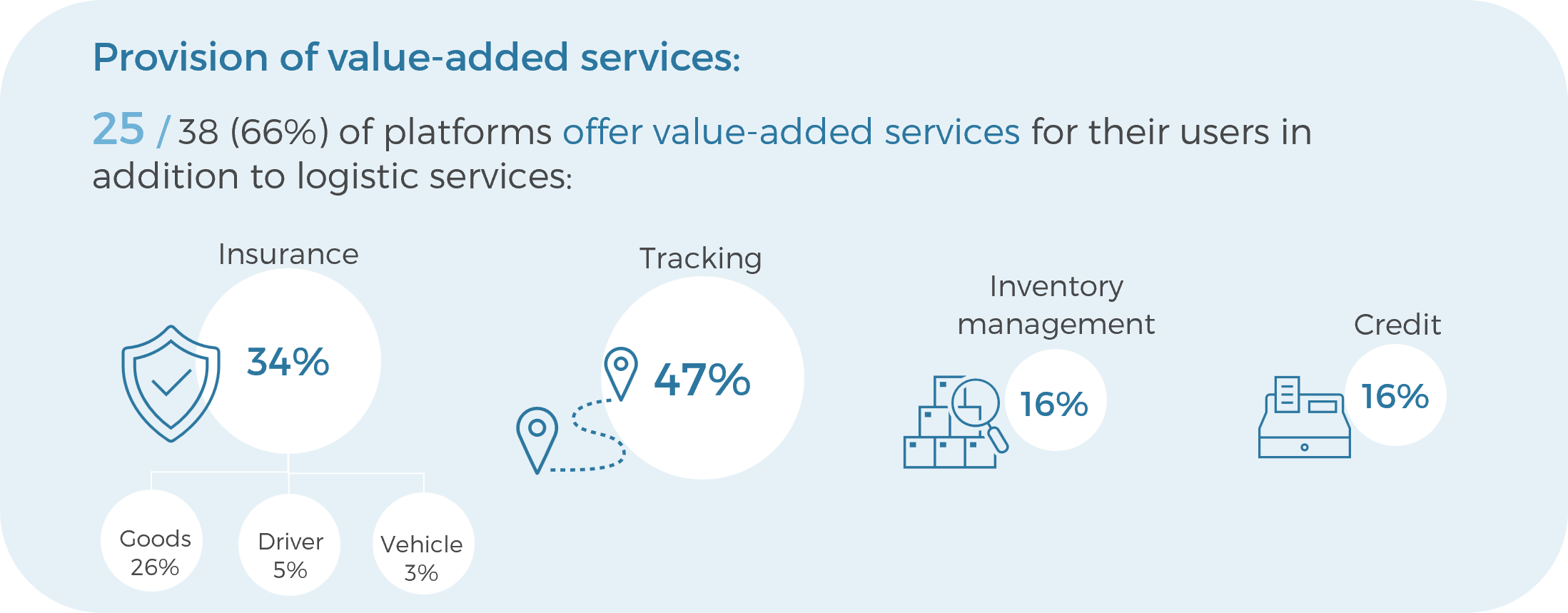Digitalisation to improve food supply chain efficiency
Digitalisation to improve food supply chain efficiency
10 December, 2021 •Can digital platforms transform first mile food logistics in Africa?
The agricultural sector is responsible for food security and is a major contributor to livelihoods across the globe, but particularly in Africa. The supply chains within the sector are vital to ensuring this contribution but they face severe fragmentation and efficiency challenges. Other industries, including logistics, have been disrupted by digital platforms and we want to explore how logistics platforms could improve the efficiency of food logistics, and by extension agricultural supply chains, in Africa.
The agricultural sector is a key source of livelihoods
In Africa, the agricultural sector employs 54% of the workforce, accounts for more than 32% of the continent’s GDP, and supports the livelihoods of 90% of Africa’s population. Looking ahead, it is predicted that agriculture will be one of the avenues that at least 70% of 220 million young Africans will turn to for income between by 2035. This means that the agriculture sector is a focal sector for improving livelihoods across the continent.
Agricultural supply chains face severe efficiency challenges
There are two key approaches to improving the productivity and global competitiveness of the African agricultural sector:
- Enhance the productivity of farming practices through precision agriculture techniques
- Improve the efficiency and reliability of produce reaching customers
In our research, we are focusing on the second approach.
Transportation and logistics are at the centre of this approach and are a vital element of the food supply chain. Logistics are also crucial to fulfilling consumer demand for deliveries that are accurate, timely and of a high quality, all while limiting food waste.
Some of the challenges that contribute to the poor efficiency of food supply chains are a lack of collaboration and poor communication among supply chain partners, underdeveloped cold chains, and poor road quality. In addition to having bad roads, most smallholder farmers in rural areas have little or no access to electricity to maintain a cold chain. This contributes to about half of the produce from smallholder farms going to waste. All of these challenges are exacerbated by the analogue nature of African food supply chains.
App-based platforms are changing the landscape of logistics
Digital platforms have profoundly transformed the landscape and business case of industries as diverse as hospitality (e.g. Airbnb), software ecosystems (e.g. Google Android), e-commerce (e.g. Alibaba), social media and marketing (e.g. Facebook), and transportation (e.g. Uber). The sweeping changes in these industries are possible because the platforms create digital networks that enhanced coordination, findability, and engagement between actors in the sector and beyond. This collaboration between actors is incredibly difficult in the logistic industry. In this context, the rise of app-based logistics and transport systems can improve efficiency and information flows within and across food supply chains.
Landscape of logistic platforms on the African continent
Similar to other regions, we can observe a rise of digital logistic platforms in Africa – we identified 38 multi-sided digital logistics platforms that operate in Africa and focus on the delivery of goods. The greatest number of these platforms operate in South Africa, Kenya and Nigeria.
There are different models emerging for logistics platforms, with on-demand logistics and parcel delivery being the most common platforms. These platforms usually do not target a specific sector but instead, offer their services across various sectors whereas B2B marketplaces focus either on the retail or the agricultural sector. In the context of first mile food logistics, only a few platforms exist and most platforms connect manufacturers with retailers rather than farmers with other businesses. We only identified three platforms that explicitly target farmers.
App-based platforms can help to overcome some of the key food logistic challenges
There are several features of digital platforms that position them as potential solutions to improve farm-to-table logistics coordination: open and participative infrastructures, simpler scaling mechanisms, and anytime access. Also, the more companies that join a platform, the better the users can leverage each of the companies’ logistics resources to create an integrated chain. And through this chain, previously isolated farmers, aggregation points, warehouses, transportation companies, wholesalers, retailers, and consumers can be actively interconnected. For instance, the B2B e-commerce platform Twiga connects logistic providers, farmers, and retailers through one platform and delivers to 10,000 retailers daily.
This integration could also translate into more efficient aggregation points, better communication between farmers and the rest of the actors in the supply chain, and easier access to transport solutions, thereby supporting a better-functioning supply chain. For farmers, the potential benefits include improved access to on-demand transportation solutions, better organisation of in-farm and between-farms produce aggregation points, increased visibility to consumers that would translate into higher demand for their products, and even access to new markets that they did not have the information or tools to reach before. This reduces the risk of spoilage and food waste at the start of the food supply chain.

Value-added services

Logistics platforms have the added benefit of offering smallholder farmers access to value-added services they may not otherwise be able to access. Of the 38 logistics platforms we identified operating in Africa, 25 already offer value-added services or products, including insurance, parcel tracking, inventory management and credit. However, the bulk of these value-added services currently focuses on the goods themselves and less on supporting logistic service providers, retail businesses or farmers by increasing their productivity. The Nigerian B2B marketplace TradeDepot is an example of a logistic platform that offers holistic services to its target market by offering an inventory management solution and working capital access to retailers.
The agricultural sector is central to African societies and economies. However, most agricultural value chains are also heavily fragmented and highly inefficient. In principle, digital good logistics platforms can help to address many of these fundamental challenges to the African agricultural sector by connecting farmers to businesses, businesses to businesses, and businesses to customers. There seems to be a clear gap for logistics platforms to coordinate and offer tangible value to the different stakeholders involved along the food supply chain and we already see pockets of this innovation happening throughout supply chains in Africa. In practice, however, on-the-ground challenges like infrastructure, digital adoption and the status quo mean that to unlock this value, platforms will need to do a lot more to integrate farmers into the platforms than simply offer a technologically enabled platform. We will explore some of the critical enablers and emerging solutions in our next article Unlocking the potential of digital platforms to transform food logistics on the African continent.
